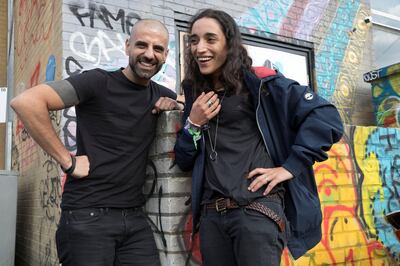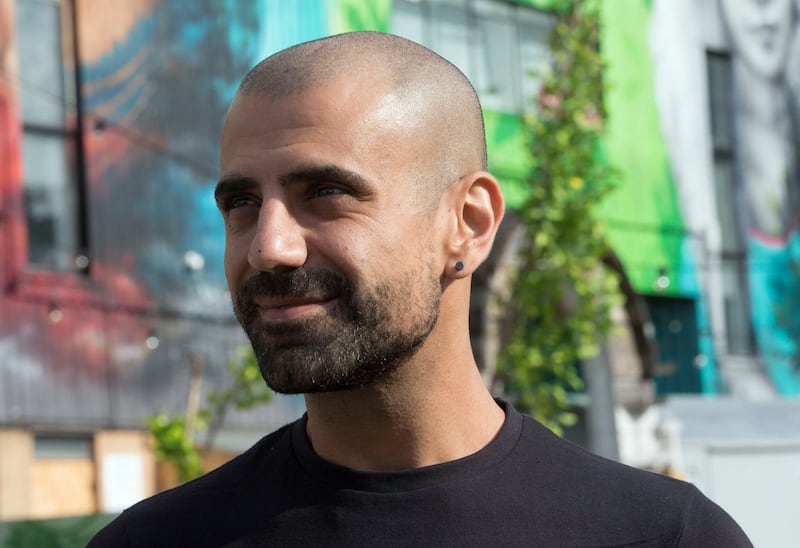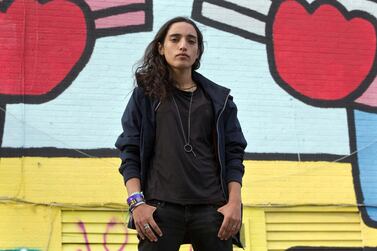When DJ Jason Kaakoush was invited to perform in Damascus last year, despite warnings from his relatives, he felt compelled to go. Kaakoush, 33, is one of the Lebanese techno scene's top talents, appearing regularly at some of Beirut's hottest night spots, including The Garten, B018 and Projekt.
He has travelled to Europe and played alongside some of the scene’s most popular stars. Last month he was in London in one of his biggest gigs to date, sharing a DJ booth with Palestinian techno pioneer Sama Abdulhadi.
Damascus, bombed and scarred from years of conflict, is a far cry from the party cities of London and Beirut. Only officially taken back by the Syrian government in 2018, the city has a long way to go before returning to any kind of normality.
Kaakoush was first invited to play in Damascus in 2017 and accepted the offer before telling his family his decision.
"I ended up turning it down because when I told my family about it, they went crazy," he told The National. "They were all against the whole idea. They were worried about my safety."
But when Kaakoush was invited a second time, to play at Upstairs, a bar in the city, in February last year, he jumped at the opportunity.
"When things started to become a little bit calmer, that's when I was like 'I'm going to do this'," he said. "I just picked up my gear and I left.

"The crowd there was amazing. They have this very raw sort of feeling – there is hunger on the dance floor. You feel like the crowd is hungry to dance and hungry for techno."
Over the past 18 months, Kaakoush has played four times in Syria, most recently at a new club called Amnesia, two kilometres north-west of Damascus. Each time, he has crossed the Lebanese border and returned the same night.
"I always do that," he said. "You never know. It's not fully in control of the government at the moment. Getting there I had to pass through nine different checkpoints. It's pretty intense." His reason for risking the danger is a personal one, having experienced first-hand what it is like to be caught up in a conflict zone. He was born in 1986 in Kuwait, where his father had moved because of the civil war in Lebanon, which went on until 1990. Only a few years later, the family moved to the US as hostility between Kuwait and Iraq started to escalate.
Returning to Kuwait in the early 1990s, the family decided in 2003 it was safe to move back to Lebanon. But before long, conflict found the DJ again – as hostilities between Israel and Hezbollah in 2006 turned into a conflict that left Beirut under siege.
"After the 2006 war in Lebanon, many DJs were refusing to come to the country. And to me as a clubber, I took it personally," he recalled. "I would love it when DJs would say we're going even though the situation was dangerous and any minute a war could break out." One DJ who continued to perform in Beirut after the 2006 conflict was trance music legend Paul van Dyk. He was a huge influence for Kaakoush, who discovered his music in 2001. Although Kaakoush's initial passion for trance switched to house music before he found his true love, techno, he remains a huge fan of the German artist. In fact, Van Dyk's is the only name Kaakoush gives when pressed to reveal his favourite DJs.
“I’m still in love with the guy’s music today,” he said.
While the Lebanese nightlife scene was known for withstanding wars, it took almost a decade for the city to recover and become the Middle East electronic music hub it is today.
It's often said that in Beirut people party like it's their last night on Earth, which Kaakoush credits to the dance floor being made up of children of war. He believes the sounds of techno music in particular resonate with people who have experienced trauma.
“Everyone in Lebanon loves to dance. Nonstop. I experienced the same thing in Syria,” he said. “I believe there is a connection between war and electronic music. These sounds. These drops. The darkness at some points. There’s a link.
"It’s the way that I see it both on the dance floor and behind the booth.”







